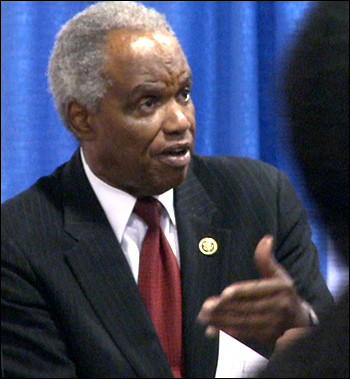By Jim Ellis
June 11, 2020 — Voting problems in Atlanta delayed counting and reporting from Tuesday’s primary, but it is now clear that nine-term veteran Rep. David Scott (D-Atlanta) has been forced into an Aug. 11 runoff election with a candidate who spent less than $1,000 on her primary campaign.With votes still being counted, Rep. Scott garnered only 46.8 percent of the vote to date, with the remaining 53.2 percent being divided among three Democratic challengers. Advancing into the runoff is former state representative Keisha Waites, who managed to attract 31.1 percent of the vote despite spending only $875.00 on her race.
In third place is former local county Democratic Party chairman Michael Owens (14.1% percent), who has previously challenged Rep. Scott in a party primary, while former East Point mayor Jannquell Peters finished fourth (8.0 percent). The latter two candidates have been eliminated.
Though tabulating continues, almost 88,000 votes have been recorded in this primary race, suggesting that turnout is robust. In the only recent Democratic primary from this congressional district, back in 2014, the total turnout was under 36,000 individuals. Combined, the latter two candidates, Owens and Peters, spent approximately $60,000. By contrast, Rep. Scott spent almost $900,000 so far on his 2020 political effort.
As mentioned above, the only other time Scott was challenged for re-nomination since his original 2002 congressional campaign came in 2014. The congressman defeated Owens in that year, 82-18 percent. In his nine general election victories, Scott has averaged 79.4 percent of the vote, including running unopposed three times.
The 13th District is a suburban Atlanta district that sits south and southwest of the city before moving westward and then north to encompass part of Cobb County. The CD contains all of Douglas county and parts of five others, including Cobb, Fulton, and Fayette. The Citizen Age Voting statistics record a 58.1% percent population figure for African Americans here as compared to 33.4 percent for non-Hispanic whites.
The 46.8 percent total is a poor result for Scott, who is generally considered to vote a bit to the right of the district’s ideological composition. He has also reached across the aisle in high profile ways such as endorsing now retired Sen. Johnny Isakson (R) in the latter man’s last election (2016). It remains to be seen if big monied left of center organizations will enter the runoff to support Waites now that Rep. Scott’s political weakness has been exposed. Suddenly, the surprising 13th District Democratic runoff is a race to watch in early August.
In the way of an update, US Senate candidate Jon Ossoff is still hovering around the 50 percent mark in his quest to win the Democratic nomination outright. Counting continues and the closeness of Ossoff teetering back and forth from 50 percent suggests it will be into next week before we know whether there will be a Senate runoff, or if the general election begins with Ossoff opposing Sen. David Perdue (R). Currently, former Columbus mayor Teresa Tomlinson is a distant second.
Three other Georgia congressional races will move into secondary runoff elections. Democrats will see 2018 nominee Carolyn Bourdeaux in the toss-up 7th District being forced to another vote opposite state Rep. Brenda Lopez Romero (D-Norcross). Bourdeaux looks to finish the final primary vote count in the 47 percent range.
Republicans will see runoff elections in the state’s two northern districts, numbers 9 and 14. Each of those seats is safely Republican. State Rep. Matt Gurtler (R-Tiger) battles retired Navy officer Andrew Clyde in CD-9. In the 14th, conservative activist Marjorie Greene and surgeon John Cowan face one another. In both instances, the Aug. 11 winner will take the seat in November against only token opposition.
Correction – South Carolina Senate
Due to lack of reporting of election returns from South Carolina on Tuesday night, we erroneously stated that Sen. Lindsey Graham was unopposed in the Republican primary. In actuality, he had three Republican opponents and scored a 68 percent nomination victory. His Democratic general election opponent, former South Carolina Democratic Party chairman Jaime Harrison, was unopposed as accurately reported.

